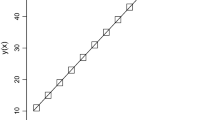Abstract
Uncertain least squares estimation is one of the important methods to deal with imprecisely observed data, which can solve linear regression equation effectively. However, the least squares estimation does not consider the influence of the error of the given independent variables data on the linear regression equation during the regression analysis. Based on the least squares estimation and uncertainty theory, this paper proposed the uncertain total least squares estimation of linear regression model. The total least squares estimation first corrects the data of the given independent variables and make the given data more precise, then solve for the expected value of the square of each of the residual, and minimize the sum of the expected values, so the regression equation obtained is more reasonable and reliable. Numerical example verify the feasibility of the total least squares estimation, and the data analysis shows that the fitting effect of the linear regression equation is good.
Similar content being viewed by others
Change history
08 April 2022
A Correction to this paper has been published: https://doi.org/10.1007/s12652-022-03844-7
References
Cao B (2020) A new estimation algorithm for regression parameters in total least squares regression model. J Dali Univ 5(6):1–6
Chang X, Shen H, Nie F, Wang S, Yang Y, Zhou X (2016) Compound rank-k projections for bilinear analysis. IEEE Trans Neural Netw Learn Syst 27(7):1502–1513
Chen D (2020) Tukey\(^{\prime }\)s biweight estimation for uncertain regression model with imprecise observations. Soft Comput 24:16803–16809
Fang L, Liu S, Huang Z (2019) Uncertain Johnson–Schumacher growth model with imprecise observations and k-fold cross-validation test. Soft Comput 24(4):2715–2720
Gong X, Liu G, Li Z, Zhou X (2014) Comparison between solutions of Total Least Squares fitting problem. Sci Surv Mapp 39(9):29–33
Guo H, Wang X, Gao Z (2014) Uncertain linear regression model and its application. J Intell Manuf 28:559–564
Li ZH, Nie F, Chang X, Nie L, Zhang H, Yang Y (2018a) Rank-constrained spectral clustering with flexible embedding. IEEE Trans Neural Netw Learn Syst 29(12):6073–6082
Li ZH, Nie F, Chang X, Yang Y, Zhang CH (2018b) Nicu Sebe, Dynamic affinity graph construction for spectral clustering using multiple features. IEEE Trans Neural Netw Learn Syst 29(12):6323–6332
Li ZH, Yao L, Chang X, Zhan K, Sun J, Zhang H (2019) Zero-shot event detection via event-adaptive concept relevance mining. Pattern Recogn 88:595–603
Liu B (2007) Uncertainty theory, 2nd edn. Springer, Berlin
Liu B (2009) Some research problems in uncertainty theory. J Uncertain Syst 3(1):3–10
Liu B (2010) Uncertainty theory: a branch of mathematics for modeling human uncertainty. Springer, Berlin
Liu B (2012) Why is there a need for uncertainty theory? J Uncertain Syst 6(1):3–10
Liu B (2015) Uncertainty theory, 4th edn. Springer, Berlin
Liu B (2021) Uncertainty theory, 5th edn. Springer, Berlin
Ning Y, Yan L, Xie Y (2013a) Mean-TVaR model for portfolio selection with Uncertain returns. Inf Int Interdiscip J 16(2):977–985
Ning Y, Liu J, Yan L (2013b) Uncertain aggregate production planning. Soft Comput 17(4):617–624
Ning Y, Pang N, Wang X (2019) An Uncertain aggregate production planning model considering investment in vegetable preservation technology. Math Prob Eng Article ID 8505868:1–10
Song Y, Fu Z (2018) Uncertain multivariable regression model. Soft Comput 22:5861–5866
Wang X, Ning Y (2017) An Uncertain currency model with floating interest rates. Soft Comput 21(22):6739–6754
Wang X, Ning Y (2019) A new stability anaylsis of uncertain delay differential equations. Math Prob Eng Article ID 1257386:1–8
Wang X, Peng Z (2014) Method of moments for estimating uncertainty distributions. Journal of Uncertainty Analysis and Applications 2:5
Wang X, Li H, Guo H (2020) A new Uncertain regression model and its application. Soft Comput 24:6297–6305
Wang S, Ning Y, Shi H, Chen X (2021a) A new uncertain linear regression model based on slope mean. J Intell Fuzzy Syst 40(6):10465–10474
Wang S, Ning Y, Shi H (2021b) A new uncertain linear regression model based on equation deformation. Soft Comput 25:12817–12824
Yang G, Xie Z (2020) Research on the algorithm of parameters estimation for linear regression on total least squares. Geomat Spat Inf 43(1):82–84
Yang G, Yu Q (2020) Research on the algorithms of parameter estimation for linear regression on total least squares. Geospat Inf 18(1):111–114
Yao K, Liu B (2018) Uncertain regression analysis: an approach for imprecise observations. Soft Comput 22(17):5579–5582
Yuan D, Chang X, Huang P, Liu Q, He ZH (2021) Self-supervised deep correlation tracking. IEEE Trans Image Process 30:976–985
Acknowledgements
This work was supported by Shandong Natural Science Foundation (No.ZR2019BG015), Shandong Provincial Higher Education Science and Technology Plan Project (No.J18KA236)
Author information
Authors and Affiliations
Contributions
HS made important contributions to model algorithms and data analysis, and wrote the manuscript. SW contributed to the conceptual and theoretical derivation of this study. XS and YN provided constructive help for the establishment of the model.
Corresponding author
Ethics declarations
Conflict of interest
The authors declare that they have no conflict of interest.
Ethical approval
This article does not contain any studies with human participants performed by any of the authors.
Consent for publication
The authors agreed to participate in the article, and the authors agreed to publish the article.
Additional information
Publisher's Note
Springer Nature remains neutral with regard to jurisdictional claims in published maps and institutional affiliations.
Rights and permissions
About this article
Cite this article
Shi, H., Sun, X., Wang, S. et al. Total least squares estimation model based on uncertainty theory. J Ambient Intell Human Comput 14, 10069–10075 (2023). https://doi.org/10.1007/s12652-021-03671-2
Received:
Accepted:
Published:
Issue Date:
DOI: https://doi.org/10.1007/s12652-021-03671-2




